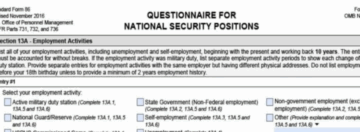Applicant Overcomes $2 Million in Debts to Get Security Clearance

Unresolved financial issues are the most common reason for the denial of a security clearance. A common misnomer is that the amount of debt directly correlates to the clearance denial. This is not true. It is the circumstances that led to the debts and actions taken to resolve the debts that weigh in more importantly. A recent Department of Energy Office of Hearing and Appeals case highlights this. Here is a summary of the case:
The DOE contractor was initially denied clearance eligibility based on financial considerations because of having over $2 million in debts. He had a personal business when married to his previous wife when she left him. She filed and was granted a petition for payment of half the value of the business which came out to $1.3 million. The contactor decided to sell his business and found investors ready to buy it from him, but before he could seal the deal the market tanked, and the sale fell through. He was left with $500k in unpaid payroll taxes owed to the IRS, $13k in delinquent child support, $298k owed for state taxes, three business credit card accounts charged off for $72k, and five other collection accounts for $10k.
You are probably shaking your head right now and thinking there is no way he is going to be able to mitigate the concerns on all of this debt. Well, he did in fact, provide mitigation on his appeal to the judge. He filed for bankruptcy to relieve all of the debts incurred by the loss of his business, reorganization by the court on the settlement agreement to pay his ex-wife a reduced amount for the now-closed business, automatic deductions from his paycheck to catch up on child support, and several witnesses provided testimony as to his honest character and continued efforts to meet all of his financial obligations. His current wife presented evidence of a frugal monthly budget and showed how they have acted responsibly in maintaining contact with all creditors, setting up payment plans and paying off collections. They also agreed to a settlement with the IRS and paid that off as well. The judge opined the contractor experienced two life events beyond his control and has taken proactive responsible actions to resolve his debts. Clearance eligibility granted.



Yeah, goes without saying that a one-off catastrophic financial event resulting from a divorce, medical crisis, or business bust clearly is not indicative of any financial irresponsibility. Usually. The fact that he could incur such a large debt is evidence of his ability to create a massively successful business in the first place. So we know that he a history of financial prudence.
And while the amount of debt is not always a factor, likewise neither is the number of delinquent accounts in some cases. E.g., 12 delinquent accounts for medical bills which were incurred over a one or two-year period usually indicates a medical crisis along with the difficulties of dealing with insurance companies and the inanity of hospital billing. Not necessarily financial irresponsibility. Meanwhile 8 delinquent accounts from Best Buy, Old Navy, Sephora, Nordstrom, Nike, etc., is fairly good evidence of irresponsibility.